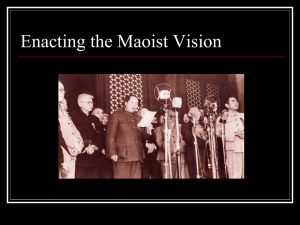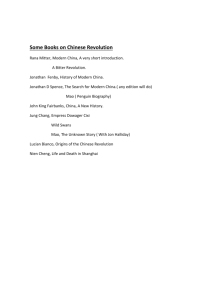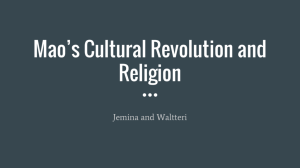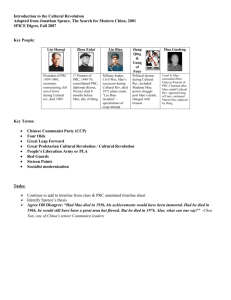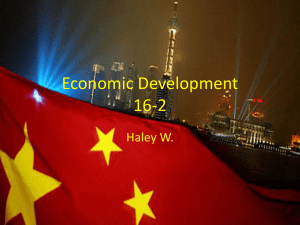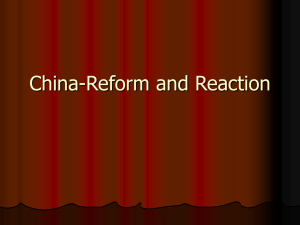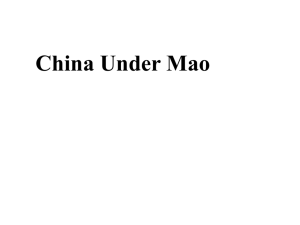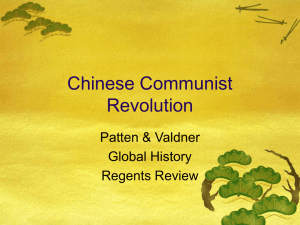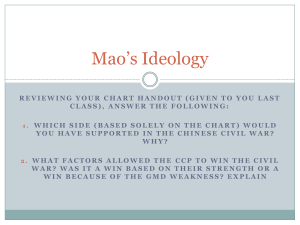PowerPoint **
advertisement
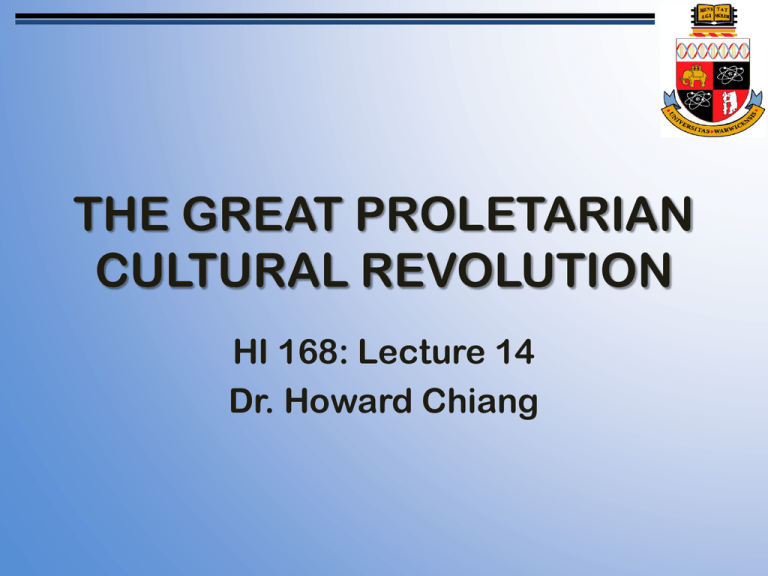
THE GREAT PROLETARIAN CULTURAL REVOLUTION HI 168: Lecture 14 Dr. Howard Chiang OVERVIEW - Socialist Education Movement Third Front Cultural Revolution: An Overview Cultural Revolution: Urban Origins Mao’s Re-Emergence & the Red Guards January Storm in Shanghai Wuhan Incident Cultural Revolution: After the Peak Fall of Lin Biao; Nixon Visits China; Gang of Four; 1976 and Hua Guofeng SOCIALIST EDUCATION MVMT - Mao & Lin vs. Liu & Deng - Aim: to restore the impetus of the drive for collectivization in the rural areas -> Grassroots corruption in countryside - December 1962: Four cleanups: - the administration of collective accounts, communal granaries, public property and work points - Xiafang: down to the countryside movement THIRD FRONT - the strategic redistribution of resources between 1964 and 1971 to create a selfreliant economy in the interior of China and away from potential military threats on China’s borders - Came from Lin Biao: bunker mentality - Sichuan provinces - left many enterprises unviable and uneconomic and extremely difficult to convert into private businesses CULTURAL REVOLUTION - 1966-1976(80): CCP at war with itself - Most dramatic clashes in Beijing, Shanghai, and Wuhan - Mao died in September 1976: - ‘decade of disaster’ - ‘decade of turmoil’ - ‘decade of internal chaos’ - Jiang Qing and the Gang of Four - Red Guards CULTURAL REVOLUTION - Initially: Beijing – Liu/Deng vs. SH – Mao - Jiang Qing (江青), Mao’s last wife - Chen Boda (陳伯達), Mao’s political secretary - Zhang Chunqiao (張春橋), Gang of 4 - Begins with an attack on the play, Hai Rui Dismissed from Office - Yao Wenyuan (姚文元), Gang of 4 - Peng Zhen’s 5-Man Group - Mao’s Cultural Revolution Group MAO’S REEMERGENCE - Liu and Deng sent work teams – supported & opposed by student groups - July 1966 – Mao swims in Yangzi River - http://www.youtube.com/watch?v=xN1P2DHE26g - August 1966 – Decision concerning the Great Proletarian Cultural Revolution - Original Red Guards – Qinghua Univ. - August 18, 1966 – Tian’anmen Square - Attack the ‘four olds’ – old ideas, culture, customs, and habits JANUARY STORM IN SHANGHAI - September 9: a group of Red Guards from Beijing who were liaising in Shanghai attempted to occupy the Shanghai CCP headquarters - November 9: the creation of a new type of organization, the Shanghai Workers’ Revolutionary Rebel Headquarters - The January Storm of 1967 - Shanghai People’s Communes - Revolutionary Committee – all China WUHAN INCIDENT - January 20, 1967 - PLA had a natural predisposition to side with conservative mass organizations - The Million Heroes - PLA vs. revolutionary rebel groups - Of the 279 members and alternates of the new party Central Committee, 45 % were from the PLA, 28 % from revolutionary party cadres, and 27 % from revolutionary masses AFTER THE PEAK - 400,000-500,000 killed in 1966-69 - The purge rate of provincial & regional officials was 70-80%; altogether about 3 million people were purged, with most rehabilitated only in the late 1970 - Fate of Liu Shaoqi – died of pneumonia - Fate of Deng Xiaoping – exile in Jiangxi - Demobilize the Red Guards – xiafang - Schools did not resume until fall 1970 FALL OF LIN BIAO - 1969 (heir apparent) -> 1971 (dead) - September 13, 1971: Lin Biao fled China in a Trident aircraft, which crashed - Official account: Lin Biao and his die-hard followers had devised a plan for a coup d’état in March to be launched on September 8. When their plot was discovered, Lin Biao, his wife Ye Qun, and his son Lin Liguo tried to flee the country in the early morning on September 13. They were all killed when their plane crashed near Ondorhaan in Mongolia. After the September 13 incident, a nationwide rectification movement to criticize and denounce Lin Biao was unfolded and the crimes of the Lin Biao counter-revolutionary clique were investigated. NIXON VISITS CHINA - Oct. 25, 1971: PRC replaced ROC’s membership in the United Nations - Richard Nixon arrived in Shanghai on February 21, 1972 - Official communiqué issued jointly at the end of visit in February: continued ties; science, technology, culture, and sport; bilateral trade; normalization of diplomatic relations - Kakuei Tanaka: Sep. 25-30, 1972 Poster for propaganda denouncing the “Gang of Four THE GANG OF FOUR - Jiang Qing, Zhang Chunqiao, Yao Wenyuan, and Wang Hongwen (rise due to Mao) - 1974: Anti-Lin, Anti-Confucius campaign: really aimed at Zhou Enlai - Deng Xiaoping recalled from exile in Jiangxi and brought back to Beijing as first vice-premier 1976 & RISE OF HUA GUOFENG - Jan. 8: Zhou Enlai passed away - Mao replaced Zhou with Hua Guofeng - The 1976 Tiananmen Square Incident: - a new breed of demonstration in PRC undirected by government or authority - July 6: Zhu De died - July 28: Tangshan eqarthquake - September 9: Mao himself died
